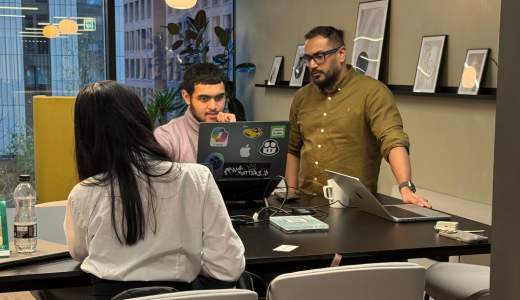
Here we are, once again on International Women’s Day, looking at gender disparity within the tech industry and tech roles. Overall, it feels like society is shifting in the right way, with positive changes to societal attitudes around gender stereotypes as well as a greater awareness around mental health issues, along with issues that face women specifically.
On top of that, we’ve seen a rise in the number of women studying A-level computing (and numbers of young people studying computing in general). We’ve also seen great success in the growth of numerous bootcamps and apprenticeships, which all help under-represented people find their way into the tech industry.
But why are we not seeing a significant shift in the numbers of women in technical or senior roles within the flourishing tech sector?
In our 2023 Digital Skills Audit, which is an in-depth report on North-West tech businesses’ growth and challenges, more than half of businesses felt that their workforce was more diverse than it was a year ago.
However, it also found that while one-third of tech employees are women, only a fifth of technical roles are held by women.
Clearly, the dial isn’t shifting significantly or fast enough.
And if we – industry and government together – are collectively going to create a world-leading digital economy, then we need to bring a greater urgency into talks about how we bring more women into the tech industry.
Positive signs
Encouragingly, from numerous panels at our annual Digital Skills Festival, the narrative around improving gender parity now includes increasing retention for women within the industry. After all, why go to all that effort to recruit more women into technical roles, if they don’t stay in the industry? A report by InnovateHer last year found that 45% more women leave the tech industry than men.
Another positive sign from our Digital Skills Festival panels is that tech businesses are now spending time looking at their recruitment processes to ensure they reach women, from the language used in recruitment job adverts to the diversity of the interview panel and the accessibility of the interview process.
Forced changes such as the swift change to working from home during the pandemic shows that hybrid or flexible working patterns made life easier for women working in tech, who are more likely to have childcare responsibilities, for example.
But why is it so important to close the gender gap in the tech industry? Of course, increasing the diversity in the tech industry is not just the right thing to do for society, but many studies have shown it’s hugely beneficial and profitable for businesses to employ a diverse workforce that is truly reflective of society.
But we also talk a lot about the specific skills shortages within the tech industry. People with digital skills are in high demand to ensure the sector grows. Our digital and tech businesses are desperate for a larger talent pool with technical skills.
According to our research, 49% of businesses reported that there is not enough experienced talent available, and 37% of businesses said that lack of quality talent was a productivity challenge.
In addition to this, 43% of tech businesses said they were unable to fill their vacancies. The top three tech roles that were the most difficult to fill were developer, DevOps and business analyst.
What needs to happen
The road to equality is paved with good intentions, but there seems to be a huge mismatch between employers’ intentions to improve their diversity (and increase their talent pool) and what resources they actually commit to making it happen.
So what does need to happen to get more women working in tech? Do we need to incentivise employers to take bigger steps to improve diversity quickly?
Across the tech regions, there are numerous events and programmes to encourage young women at school and college to consider a career in tech. However, this relies heavily on business sponsorship. Without larger funding pots, these cannot be rolled out on a larger scale.
Women have a huge role to play in the growth of the UK tech industry across all the nations and regions, with all of its sub-sectors and wealth of career opportunities.
But we would like to see both the tech industry and the government put their money where their mouth is and commit fully to ensuring young women know that there is a place for them in the tech industry – including the board room.
A career in tech is indeed a great leveller, especially if we can continue to grow the regional tech clusters across the UK.
Katie Gallagher is the managing director of trade body Manchester Digital, chair of the UK Tech Cluster Group and founder of the North West Cyber Resilience Centre.








